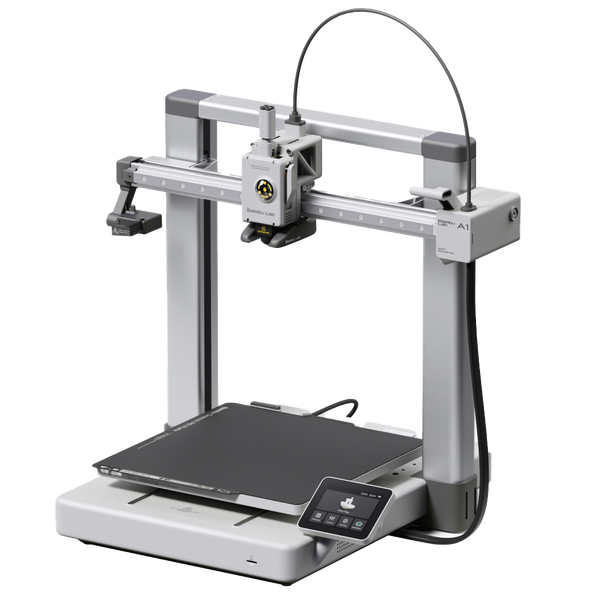If you make a purchase using a shopping link on our site, we may earn a commission. Learn More
Comparing the Bambu Lab A1 and Creality Ender 3 V2

Bambu Lab A1
(~10.25 x 10.25 x 10.25 in)
Vs.

Creality Ender 3 V2
(~8.75 x 8.75 x 10 in)
About the Bambu Lab A1
The Bambu Lab A1 is a midrange 3D printer that offers fast print speeds, advanced sensors, and above-average print quality. Its 256 x 256 x 256 mm build volume is slightly larger than machines such as the Creality Ender 3 series, and matches that of the Bambu P1P and X1C. It's notably larger than the 180 x 180 x 180 mm build volume of the A1 Mini, making it a clear upgrade from that machine. The A1 uses a Cartesian "bedslinger" design, in which the X axis raises on a gantry and the bed moves back and forth along the Y axis. This design is shared with many other 3D printers in the A1's price range, but is unusual for Bambu Lab--most of their other machines use the CoreXY motion system instead. The motion system on the A1 uses linear rails to decrease vibration, allowing for high print speeds. Similar to Bambu's other printers, the A1 includes a direct drive extruder with an all-metal hot end capable of heating to 300°C, allowing it to print most standard filament types, including flexible filament. However, since the printer isn't enclosed, it won't be an ideal choice for printing materials such as ABS and ASA that benefit from an enclosure. The A1 includes advanced firmware features and sensors that should improve its print quality and ease of use compared to other 3D printers in its price class. In addition to automatic bed leveling and Z offset calibration (which is starting to become a common feature in printers in this class), the A1 includes a sensor in the hot end which allows it to calibrate the flow rate of the filament to further improve print quality. Like the rest of Bambu's lineup, the A1 includes WiFi connectivity and has an integrated camera. These features allow you to monitor and control the printer remotely using the Bambu Studio computer application or the Bambu Handy smartphone app. The A1 is also available in a bundle with the Bambu Lab AMS Lite, a multi-material system that allows the A1 to print with up to 4 different filament spools at once. The Bambu A1 shares many of its fundamental specs with a number of 3D printers from other manufacturers, many of which come in at a lower price. However, its advanced firmware features, overall build quality, and convenience features such as the integrated camera and flow rate sensor give it a few key advantages over its competition that may make it worth a look as a more premium option in its class.
About the Creality Ender 3 V2
The Creality Ender 3 V2 is a budget-friendly 3D printer that offers modern features without breaking the bank. With its affordable price point, this printer still delivers excellent print quality. It has a decent print volume of 220 x 220 x 250 mm, making it suitable for printing models and small parts while not taking up too much space on a desk. One standout feature of the Creality Ender 3 V2 is its Carborundum Glass bed, which provides a smooth and durable surface for printing. However, it is worth noting that this printer requires manual bed leveling using nuts on each corner of the print bed, which may require periodic adjustments for optimal first layer adhesion. Additionally, the printer does not come with a touch screen interface or newer mainboard features like print resume after power failure or silent stepper motor drivers for quieter printing. It also lacks safety features such as thermal runaway protection. Despite these drawbacks, the Creality Ender 3 V2 offers a good printing experience at a low price point. It may not have all the premium features of more expensive printers, but it still delivers reliable performance for those willing to put up with some missing quality of life features.
Click here to view the Bambu Lab A1 on the Bambu Lab website.
Click here to view the Creality Ender 3 V2.
You can find a side-by-side comparison of the specifications for these two printers in the table below:
Details & Specifications
Bambu Lab A1
Creality Ender 3 V2
General
Extruder & Hot-end
Physical Characteristics
Usability
Electronics
Where to Buy
Brands Overview
Bambu Lab
Bambu Lab, based in Shenzhen, China, and founded by five ex-DJI engineers, has made notable strides in the 3D printing arena with their unique combination of innovation and user-friendly interfaces. They launched their journey with a successful Kickstarter campaign in 2022, securing over $7 million in funding. Their printer lineup, from the flagship Bambu X1-Carbon to the more affordable Bambu P1P, showcases their commitment to high-performance features while ensuring ease of use, making them a rising competitor in the 3D printing industry.
Creality
Creality is the largest manufacturer of consumer 3D printers, and is a well-known brand in the 3D printing industry, offering a range of printers for various budgets and needs. Creality, based in Shenzhen, China, was founded in 2014. Their initial product was the CR-3, followed by the CR-10 in 2017 with a much larger build volume than anything else in the same price range. The Creality Ender 3, released in 2019, greatly expanded the market for low cost 3D printers. Creality has an extensive lineup of 3D printers, covering budget, midrange, premium, and professional categories. Their cost-effective approach includes using off-the-shelf components, open design, shipping printers in kit form, and aluminum extrusions for frames and gantries. Creality offers so many options that it can be overwhelming to choose between all of the available models, so its important to have an understanding of what features are important to you when shopping for a Creality 3D printer.